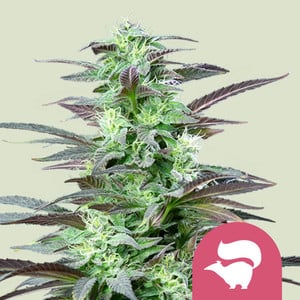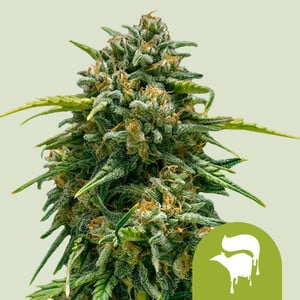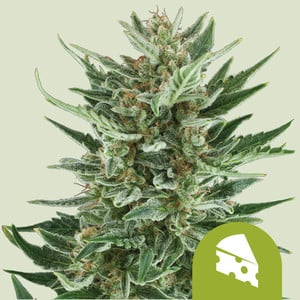.
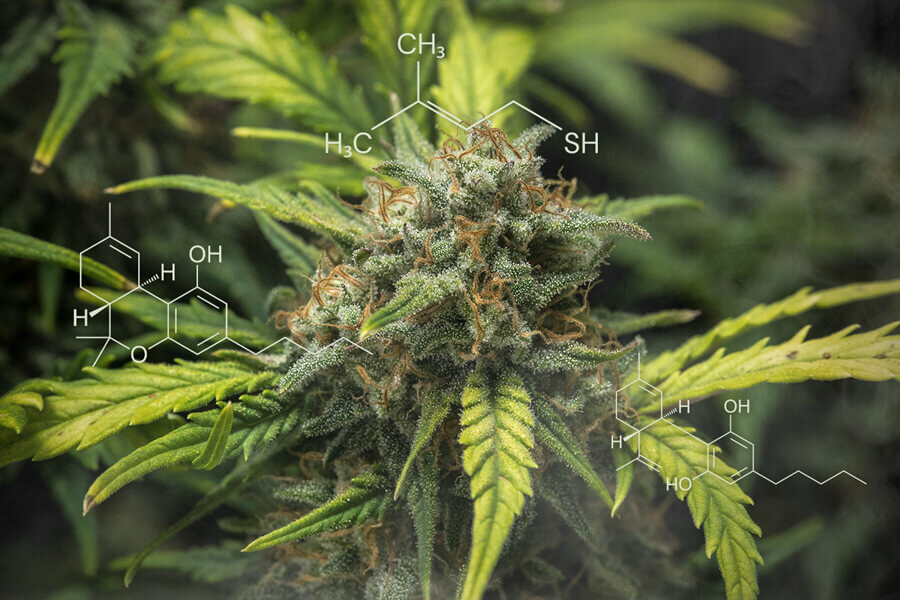
Cannabis Chemistry: Exploring Volatile Sulphur Compounds
You've heard of cannabinoids and terpenes. However, there's a newly discovered and incredibly skunky group of marijuana molecules in town. Say hello to volatile sulphur compounds! Learn everything you need to know about these pungent chemicals, including their aromas and potential effects.
Contents:
Cannabis plants produce a whole lot more than just THC and CBD. As scientists and the general public become more acquainted with aromatic terpenes, many weed users have discovered a new-found appreciation for the chemical complexity of their favourite herb. But terpenes alone aren’t responsible for the complex flavours and aromas of different strains. Recently, researchers discovered a new class of constituents called volatile sulphur compounds (VSCs), which underscore the pungent, skunky aromas characteristic of many cultivars.
Continue reading to find out all you need to know about VSCs. We’ll cover their role in plants and their potential benefits in humans. Then, we’ll introduce you to three strains that contain high levels of these skunky molecules.
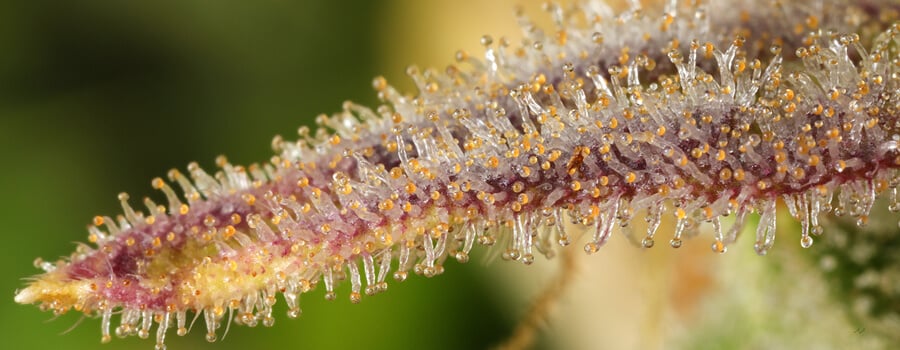
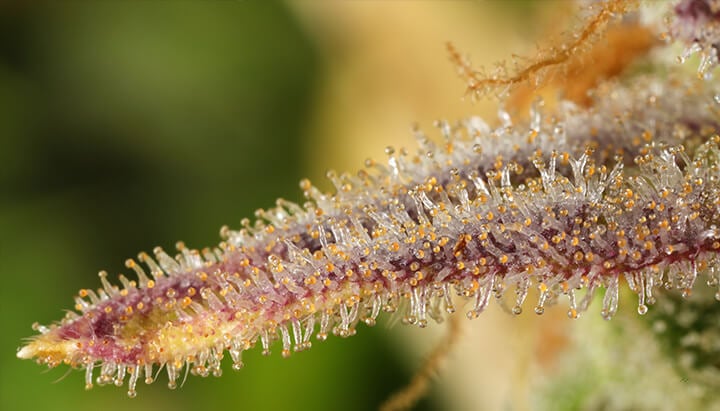
Volatile Sulphur Compounds: A Novel Class of Cannabis Chemicals
Following the sweeping legalization of cannabis and its increasing popularity among recreational and medical users, researchers continue to probe the herb in an effort to unveil its botanical secrets. In 2021, researchers broke ground when they discovered[1] a new class of prenylated volatile sulphur compounds in the cannabis plant. While over 200 terpenes contribute to the unique aromas of cannabis, these compounds aren’t responsible for the skunky scent that matches that found in the spray of skunks themselves—a scent made powerful by VSCs.
With this in mind, scientists from the Department of Research and Development at Abstrax Tech, California hypothesised that similar compounds could be lurking below the surface, hitherto undetected, in cannabis flowers. Running gas chromatography analyses on 13 cannabis cultivars confirmed their suspicions; the most pungent strains contained multiple VSCs. But, past their powerful skunky smell, what are VSCs, exactly? Why do cannabis plants produce them, how do they influence the cannabis experience, and what benefits do they provide?
VSCs: Their Role in Nature
Plants don’t produce chemicals with humans in mind. Moreover, they don’t waste precious resources synthesising molecules that don’t help them survive or thrive. So, where do VSCs fit into this picture? Find out why cannabis plants produce these phytochemicals below.
-
Defence
Much like cannabinoids and terpenes, VSCs are secondary metabolites; plants don’t depend on them for growth and reproduction but to protect themselves against a range of external threats. Humans have a long history of using sulphur compounds in agriculture, with the Sumerians using them way back in 2500 BCE for insect control[2]. Plants, as well as their microbial allies, also use them as natural pesticides. For example, bacteria that inhabit the tissue of potato plants emit sulphur compounds to protect their host[3] against oomycete infections.
-
Signalling & Communication
Plants don’t talk, but they certainly communicate. Instead of using words, their language lies in the production and emission of chemicals. Plant-to-plant signalling takes place for several reasons, including as warnings of predatory grazing. In response, recipients ramp up the production of protective compounds. VSCs play a role in this fascinating process of plant-to-plant communication.
-
Attraction of Pollinators
Most plants use sweet and floral scents to attract pollinators. Along with smelling good to the human nose, these aromatic compounds are vital in the reproduction of many plant species. However, other plants take a rather unusual strategy and opt to use VSCs to attract pollinators instead. As opposed to smelling pleasant, VSCs are used by plants such as Amorphophallus titanum (corpse flower) to replicate the smell of decay to attract flies[4] and dung beetles. Several orchid species[5] also use VSCs to attract pollinators.
-
Growth Regulation & Nutrient Acquisition
VSCs also play an important role in growth regulation in some plant species. However, these compounds aren’t always produced by plants themselves. In the case of Nicotiana attenuata, sulphur compounds produced by beneficial bacteria contribute to sulphur acquisition[6] and help to increase the surface area of leaves, resulting in increased photosynthesis and subsequent growth and vitality.
-
Allelopathy
Several volatile organic compounds, including some VSCs, contribute towards allelopathy—the chemical inhibition of one plant by another. For example, diallyl disulfide, a VSCs found in garlic, has the ability to impact cell division, root cell length, plant hormone levels, and gene expression in nearby tomato plants.
-
Where to Find Sulphur Compounds
You’re now aware of the role of VSCs in plants as a whole. But where exactly do these compounds show up in nature besides cannabis? Featuring a range of nutritional benefits[7], the plants (and fungi) below all contain notable levels of VSCs.
- Brassicas: Broccoli, cabbage, cauliflower, Brussels sprouts, and kohlrabi produce a range of dietary volatile sulphur compounds. For example, most of these vegetables contain isothiocyanates, which display a variety[8] of potential benefits.
- Alliums: The allium family includes onions, garlic, and leeks. These vegetables produce VSCs such as allicin, diallyl sulphide, and thiosulfinates. Allicin stands out with antimicrobial properties[9] and antioxidant effects.
- Mushrooms: Humans have used mushrooms for numerous reasons for thousands of years. It just so happens that some members of the fungi kingdom of life also produce VSCs. These molecules contribute to the benefits and flavours of shiitake, truffles, button mushrooms, chanterelles, porcini, and oyster mushrooms.

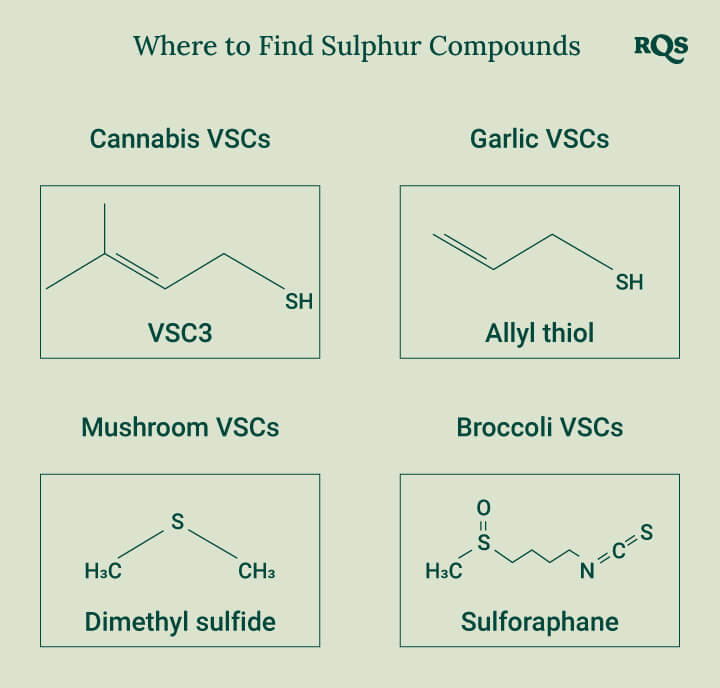
Types of VSCs Found in Cannabis
One VSC in particular, 3-methyl-2-butene-1-thiol, known more simply as VSC3, shows up most abundantly in cannabis samples and underpins the skunk-like aroma of certain strains. However, this is the tip of the iceberg when it comes to the potential influence of VSCs on the cannabis experience. Discover the rest of the picture below.
-
Flavours and Aroma of Cannabis Sulphur Compounds
As it stands, researchers have categorised[10] the known VSCs in cannabis into three distinct flavour groups:
- Savoury exotic: First of all, the likes of diprenyl disulfide and diprenyl sulfide are responsible for pungent, sulphuric, and alliaceous notes.
- Prototypical: Next up, the aforementioned VSC3, along with prenylthiol, prenylthioacetate, and prenylmethyl sulfide, underpin the classic skunky aromas.
- Sweet exotic: Finally, the sweet exotic class of VSCs, containing 3-mercaptohexanol (3MH), 3-mercaptohexyl acetate (3MHA), and 3-mercaptohexyl butyrate (3MHB), found in passionfruit and grapefruit, offer notes of citrus, sulphur, and fruit.
-
The Effects of Volatile Sulphur Compounds
Volatile sulphur compounds are newly discovered cannabis components. Because of this, their effects in the context of the cannabis high are very much understudied. However, when taking a look at developing research on terpenes, it raises the possibility that VSCs could interact with both cannabinoids and terpenes to influence the subjective effects of each strain. Future research on this emerging chemical class should create a clearer image of just how influential VSCs are over the effects of the herb.
The Benefits of VSCs: A Look at the Research
Outside of the context of cannabis, researchers have tested a suite of VSCs for their potential health benefits. While the newly discovered VSCs in cannabis have yet to feature in any studies, research surrounding more familiar sulphur compounds could offer insight into their potential benefits.
-
Cardiovascular Health
Both hydrogen sulphide (H₂s) and sulphur dioxide (SO₂) serve as endogenous gas signalling molecules in the human body. Adding to this, research[11] has found that both molecules provide important protective effects within the cardiovascular system, leading scientists to conclude that “This, in turn, could expedite the advancement and utilisation of drugs associated with H₂s and SO₂ in the coming years”.
Adding to this, the VSC allicin, derived from vegetables of the allium family, also shows potential in the arena of heart health. Researchers have noted[12] that “...allicin, a sulphur compound naturally derived from garlic, has shown beneficial effects on several cardiovascular risk factors through the modulation of cellular mechanisms and signalling pathways”.
-
Antimicrobial
Regarding the antimicrobial potential of VSCs, we turn our attention to allicin once again. Garlic has been used to ward off microbes since antiquity, but what does science have to say on the matter? Well, a review[13] penned by researchers at the Weizmann Institute of Science, Israel notes the antibacterial, antifungal, antiviral, and antiparasitic activity of the molecule. They state that “The main antimicrobial effect of allicin is due to its chemical reaction with thiol groups of various enzymes…”.
-
Metabolic Health
Dietary sulphur compounds found in vegetables are a source of sulphur, an element that plays a key role in human metabolism. Accessing proper levels of this essential nutrient helps to maintain proper cellular signalling[14], energy production, structural support, and the detoxification of free radicals.
The Future of VSCs in the Cannabis Industry
As a plant that smells like skunk, cannabis contains pungent molecules similar to those found in the animal itself! This newly discovered group of VSCs underpins the potent, gassy, skunky, and garlic-like aromas of many weed strains.
Distinct from terpenes, they’ve filled breeders, growers, consumers, and the industry as a whole with excitement. While the research remains extremely early, future studies could unveil that these compounds impact the cannabis high in a similar way to terpenes, which could give rise to a host of new strains and tailored-made extracts. Studies on VSCs and other sulphur compounds not derived from the cannabis plant also hint at the benefits these molecules could provide. Keep your eyes peeled to see how VSCs impact the cannabis industry going forward.
Skunky Cannabis Strains Packed With Sulphur Compounds
Have you always viewed yourself as a fan of gassy terpenes? Well, it’s time to give VSCs the credit for this delightful sensory experience! If you’re seeking some of the best sulphur weed out there, you need to try your hand at growing the three super skunky strains below.
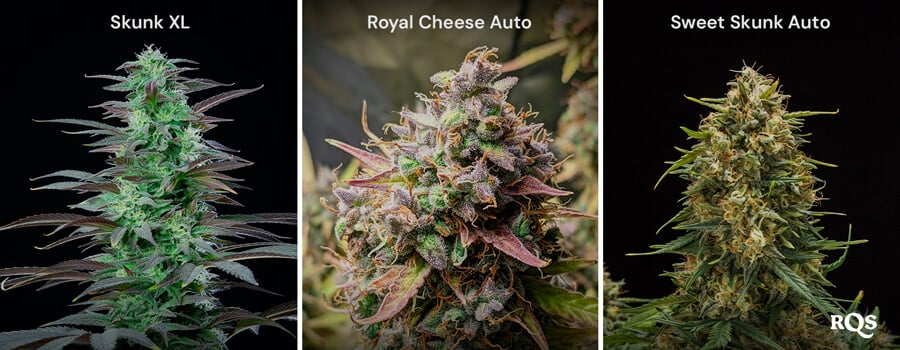
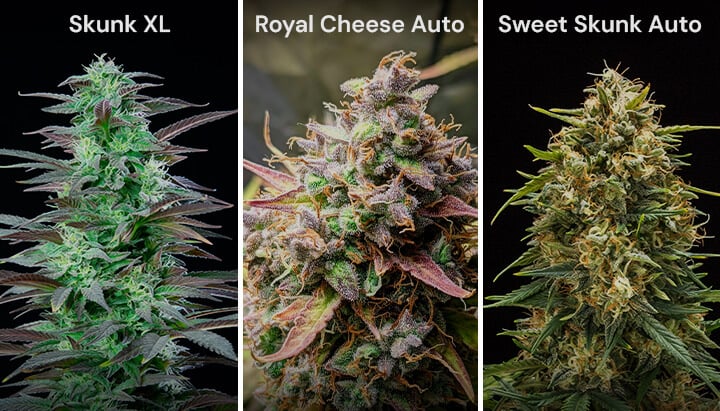
Skunk XL
As the direct descendant of Skunk 1 and Afghan, Skunk XL inherited serious levels of VSCs. Start your seeds using the paper towel method and go on to transplant shoots directly into 10–15 l containers. Maintain a consistent temperature of 22°C and expect your plants to reach a height of 3 cm by the end of week one, 7–10 cm by the end of week two, and up to 15–20 cm by the end of week three. Apply LST at this point to keep your plants compact or let them produce a large central cola. Your plants will reach a height of around 40 cm by the end of week five. Switch to a light cycle of 12 hours on and 12 hours off at this point to induce flowering.
Your Skunk XL plants will stretch to 60–200 cm during bloom depending on pot size and the training techniques you used. Defoliate them frequently to reduce the chance of mould by boosting aeration in the canopy. Prepare to harvest up to 650 g/m² from indoor plants and 675 g/plant from those grown outdoors after a flowering phase of 8–9 weeks. Get ready to enjoy super-skunky buds with hints of pine and a stoning but clear-headed high.
Skunk XL
Skunk 1 x Afghan
600 - 650 gr/m2
60 - 100 cm
55 - 60 days
THC: Up to 17%
Sativa 50% Indica 50%
625 - 675 gr/plant
160 - 200 cm
October
Balanced, Clear, Stoned
Sweet Skunk Auto
Our skilled breeders created this indica-dominant and VSC-rich hybrid by crossing Early Skunk, Critical, and a ruderalis specimen. Sow your Sweet Skunk Auto seeds directly into 11 l pots and keep your lights running for 24 hours per day to eliminate the risk of leggy seedlings. These compact plants will grow to 4 cm by the end of week one, 15 cm by the end of week two, 20–25 cm during week three, and up to 30cm by the end of veg.
Your Sweet Skunk Auto specimens will stretch to a final height of just 40–100 cm during flowering. Switch to a liquid fertiliser high in phosphorus and potassium to facilitate optimal bud formation, and flush your plants during the final two weeks of bloom. Prepare to harvest 400–450 g/m² from indoor plants and 60–110 g/plant from their outdoor counterparts. Sit back and enjoy skunky and gassy flavours and an uplifting high.
Sweet Skunk Auto
Early Skunk x Critical x Ruderalis
400 - 450 gr/m2
40 - 80 cm
55 - 60 days
THC: Up to 15%
Sativa 10% Indica 60% Ruderalis 30%
60 - 110 gr/plant
60 - 100 cm
Clear, Uplifting
75 - 85 days after sprouting
Royal Cheese Auto
Leveraging large quantities of VSCs, this progeny of Cheese, Royal Critical, and ruderalis serves up delicious flavours of cheese, pepper, and skunk. Sow your Royal Cheese Auto seeds directly into 11 l pots, keeping them moist and exposed to constant temperatures of 22–25°C. Once sprouts breach the soil, you can expect your plants to grow to 5 cm, 13–15 cm, 20–25 cm, and 30–35 cm by the end of weeks one, two, three, and four, respectively. From this point, your plants will start developing visible preflowers, marking their transition into bloom.
As your Royal Cheese Auto plants start to stretch up to 60–120 cm, keep their canopies aerated by defoliating liberally. Reduce your indoor light cycle to 12 hours on and 12 hours off and apply a thick layer of mulch around outdoor plants in hot and dry regions. Have enough stash jars to hand to harvest 425–475 g/m² from indoor plants and up to 210 g/plant from outdoor specimens. After drying and curing your stash, you’ll enjoy pungent skunky notes and a relaxing high fuelled by a moderate THC content of 15% alongside medium levels of CBD.
Royal Cheese Auto
Cheese x Royal Critical x Ruderalis
425 - 475 gr/m2
60 - 100 cm
50 - 55 days
THC: Up to 15%
Sativa 30% Indica 50% Ruderalis 20%
160 - 210 gr/plant
60 - 120 cm
Physically Relaxing, Stoned
75 - 85 days after sprouting
- Why cannabis smells skunky https://www.sciencedaily.com
- Integrated Pest Management for Sustainable Intensification of Agriculture in Asia and Africa - PMC https://www.ncbi.nlm.nih.gov
- A sulfur-containing volatile emitted by potato-associated bacteria confers protection against late blight through direct anti-oomycete activity | Scientific Reports https://www.nature.com
- How the volatile organic compounds emitted by corpse plant change through flowering | Scientific Reports https://www.nature.com
- The volatile chemistry of orchid pollination - Natural Product Reports (RSC Publishing) DOI:10.1039/D2NP00060A https://pubs.rsc.org
- Revisiting bacterial volatile-mediated plant growth promotion: lessons from the past and objectives for the future - PMC https://www.ncbi.nlm.nih.gov
- Major Sulphur Compounds in Plants and their Role in Human Nutrition and Health https://www.researchgate.net
- A Comparative Review of Key Isothiocyanates and Their Health Benefits - PMC https://www.ncbi.nlm.nih.gov
- Allicin extracted from Allium sativum shows potent anti-cancer and antioxidant properties https://www.sciencedirect.com
- Minor, Nonterpenoid Volatile Compounds Drive the Aroma Differences of Exotic Cannabis - PMC https://www.ncbi.nlm.nih.gov
- Frontiers | Sulfur signaling pathway in cardiovascular disease https://www.frontiersin.org
- Cellular Mechanisms Underlying the Cardioprotective Role of Allicin on Cardiovascular Diseases - PMC https://www.ncbi.nlm.nih.gov
- Antimicrobial properties of allicin from garlic https://www.sciencedirect.com
- Sulfur-Element containing metabolic pathways in human health and crosstalk with the microbiome - PMC https://www.ncbi.nlm.nih.gov


























